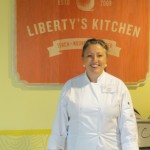Alumni Spotlight: Nadia Minniti ’11
As a chef, I learned the techniques; as a restaurant manager, I learned the business aspect of the restaurant world. However, I knew that my journey was not complete. Although I had a bachelor’s degree in Food Service Management, I realized that I wanted and needed to explore the cultural aspect of food, and how people relate to the food they eat and grow. After looking for a master’s degree in Gastronomy, and realizing that none were available near home, I did an internet search on any food and culture classes available in the area. I found a French Gastronomy seminar in the NC State MALS Program, and contacted Dr. Garval to inquire. What followed was a two-hour conversation over food and gastronomy during my entrance interview. I was so excited to have found a flexible program that allowed me to create my own plan of study to concentrate on the area that was of most interest to me and useful in my career.
When I decided to pursue a Master of Arts in Liberal Studies with a concentration in Gastronomy, I knew I was pioneering something, since a degree in food history and the food and culture relationship was not available at NC State at the time. The courses I chose have allowed me to explore the relationship of humans with the food they grow, the legal aspects of food production, the history of food, food as a tourist destination and motivation for travel, and ways of feeding developing nations in a sustainable way. These areas of study helped me a great deal when I became a culinary arts instructor. What the concentration in Gastronomy gave me was knowledge of how people relate to food, which is something that is not taught in culinary arts. I am able to provide my students with a different perspective and an increasingly knowledgeable approach to food.
I am currently the culinary arts instructor in charge of the Culinary Arts Program at Wilson Community College. I have been the head of the program for about three years, which is almost from its inception. I have been busy writing curriculum that is meaningful to both the students and the employers who will be hiring our graduates. I have also been working on establishing a successful and bountiful garden for our program, as I established it as a farm-to-table Culinary Arts degree. While working at Wilson Community College, I noticed the tremendous need for fresh produce access. Wilson is composed of a series of food deserts. With the help of the agricultural education classes at a local high school, and with donations of lumber and dirt, I created an outreach program called Grow it Forward. This program loans 4×4 individual raised beds and vegetable plants to low-income housing residents who live in food deserts in Wilson. This program also provides mentorship on gardening with the help of the Master Gardeners located in Wilson. As of today—we are in our second year of operation—we have 31 boxes and many happy folks who have free access to fresh produce without leaving their yard.
If I think back to memories of my time in MALS, one stands out the most. I was a student in Dr. Patterson’s seminar on Global Sustainable Human Development, and Dr. Patterson was telling the students how important protein intake is for residents of underdeveloped countries. I noticed that some students could not understand the connection and I asked Dr. Patterson if I could take over the classroom instruction for five minutes. He graciously agreed and allowed me to take over the class while I explained why proteins are so vital for our survival, writing on the board the sources, functions, and deficiencies of proteins. After class, he called me aside, and I was sure I was going to be reprimanded for interrupting his class. Instead, he complimented me on my teaching technique and way of communicating information. He strongly suggested that I teach in a higher education setting, as more people like me are needed. At the time, I was a high school teacher. Needless to say, I took his advice, and now teach at a community college. I also hope, one day, to teach at a four year university.
